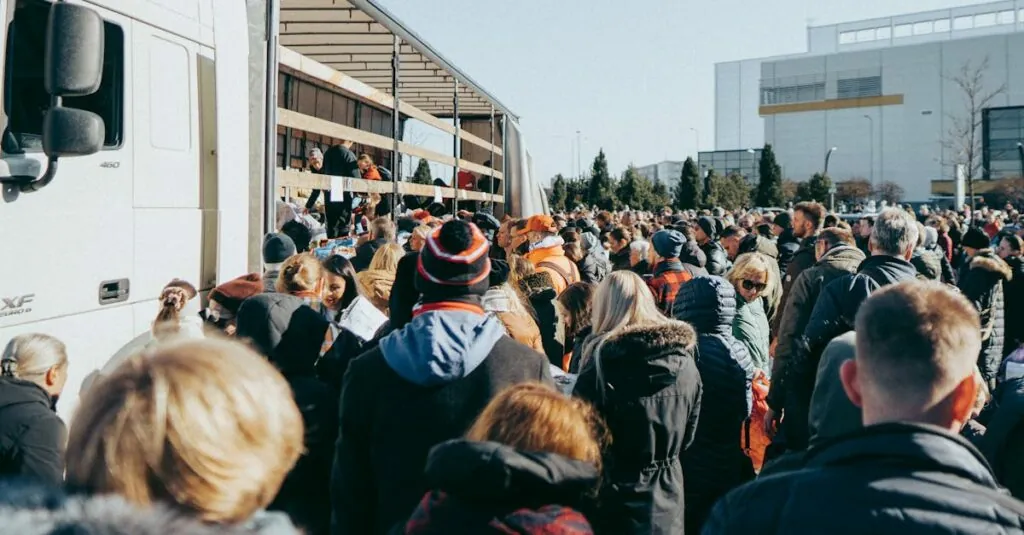In a world where social media reigns supreme, the battlefield has shifted from traditional warfare to something far more chaotic and entertaining: the social war. It’s not just about likes and shares anymore; it’s a full-on clash of opinions, memes, and hashtags. Picture this: keyboard warriors armed with snarky comments and viral videos, ready to defend their beliefs at all costs.
As society grapples with polarizing issues, the stakes have never been higher. Social wars can ignite debates, spark movements, and even change the course of history—all from the comfort of a couch. Whether it’s a trending topic or an influencer’s hot take, the digital arena is alive with conflict. So grab your popcorn and get ready to dive into the wild world of social war, where every tweet could be a battle cry and every post a potential peace treaty.
Table of Contents
ToggleUnderstanding Social War
Social war refers to the modern conflicts arising primarily on social media platforms. These disputes manifest through opinions, memes, and hashtags, often creating divisive environments.
Definition of Social War
Social war encompasses digital struggles where users passionately defend their views. Participants, known as keyboard warriors, engage in fierce conversations, amplifying their messages through viral content. Such engagements reflect emotional stakes, impacting relationships and public perceptions. The digital landscape provides an arena where expressions translate into ideological battles, demonstrating the power of online interactions in shaping societal narratives.
Historical Context
Historical aspects of social war reveal its evolution from traditional activism to online movements. Earlier social battles occurred in physical spaces, often mobilizing communities around shared causes. With the advent of social media, movements like Arab Spring and Black Lives Matter leveraged digital platforms for awareness and organization. Past conflicts laid the groundwork for today’s rapid-fire exchanges, enabling users to connect regardless of geography. Continuous shifts in communication methods have transformed social interactions into catalysts for change, demonstrating the profound influence of digital dialogue.
Causes of Social War
Social wars arise from various interconnected factors that fuel conflict online. These causes include economic disparities and political tensions.
Economic Factors
Economic pressures contribute significantly to social wars. People experiencing financial stress often express frustration online. Moreover, unemployment rates can exacerbate discontent, leading to heated discussions on wealth distribution. Social media amplifies these voices, making economic grievances more visible. For example, movements advocating for fair wages and social equity gain traction when individuals share personal stories online. Inequality in access to resources ignites debates, and those impacted by economic instability rally together. Social platforms provide a space for collective expression, transforming economic frustration into social activism.
Political Tensions
Political divisions frequently spark social wars as well. Polarizing issues, such as immigration and healthcare, generate passionate debates online. Individuals align themselves with different political ideologies, often leading to confrontational exchanges. For instance, during election seasons, campaigns utilize social media to amplify their messages, which can provoke fierce backlash from opposing views. Users often create or share content that challenges political opponents, reinforcing their stances. In this environment, misinformation spreads rapidly, further deepening divisions. Ultimately, the intersection of political discourse and social media fuels continuous conflict among users, transforming healthy debate into social warfare.
Major Examples of Social War
Social wars have manifested in various forms across history, showcasing intense conflicts ignited through digital platforms. Here are significant case studies illustrating these phenomena.
Case Study: France 1968
France 1968 exemplifies a significant social upheaval marked by student protests and labor strikes. Activists utilized pamphlets and posters to disseminate their messages, galvanizing widespread participation. Public demonstrations transformed urban spaces into vibrant sites of resistance. Students rallied against educational reforms while labor unions joined the movement, advocating for workers’ rights. This collective action emphasized solidarity, influencing future protests. The legacy left a lasting impact on societal dynamics and labor relations.
Case Study: The Arab Spring
The Arab Spring represents a crucial moment in modern social wars, beginning in late 2010. Citizens across North Africa and the Middle East utilized social media to organize protests against oppressive regimes. Platforms like Twitter and Facebook played pivotal roles in mobilizing crowds and sharing real-time updates. Activists spread information quickly, circumventing state-controlled media. Each uprising demonstrated the power of online connectivity, inspiring masses to demand change. Countries like Tunisia, Egypt, and Libya witnessed historic transformations, altering geopolitical landscapes worldwide.
Impacts of Social War
Social wars significantly shape both societal dynamics and governance structures. They can drive change rapidly and influence public opinion across various demographics.
On Society
Social wars foster polarization within communities. Disagreement over key issues, such as race, gender, and inequality, intensifies online interactions. Individuals often identify with like-minded groups, reinforcing echo chambers. Misinformation spreads quickly, leading to confusion and mistrust among different social factions. These conflicts create opportunities for grassroots movements, enabling participants to mobilize and advocate for change. Social media platforms serve as battlegrounds for beliefs, impacting how people perceive each other and interact offline. Changes in public discourse often follow, affecting cultural norms and behaviors.
On Governance
Governance faces new challenges due to social wars. Elected officials and bodies must navigate highly charged dialogues and public opinions shaped by online platforms. Political strategies evolve as social media becomes a primary tool for campaigning and communication. Officials increasingly respond to social movements, shaping policy decisions based on viral concerns. Digital activism pressures governments to address issues like justice, environmental policy, and public health. Thus, policymakers must engage with constituents in real time, balancing public sentiment against legislative processes. The relationship between governing entities and the electorate transforms, often leading to more responsive governance.
Social wars represent a significant shift in how conflicts are fought and resolved in today’s digital age. The rise of social media has transformed individual opinions into collective movements that can spark change and challenge the status quo. While these online battles can deepen divisions and spread misinformation, they also provide a platform for marginalized voices and grassroots activism.
As society continues to navigate this complex landscape, understanding the dynamics of social wars becomes crucial. The ability to engage thoughtfully and critically in these dialogues can empower individuals to contribute positively to the ongoing conversations shaping our world.





